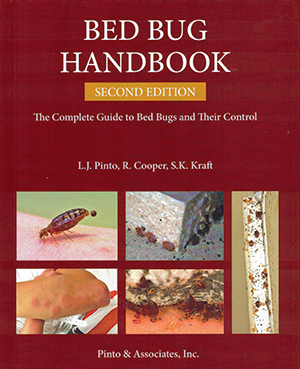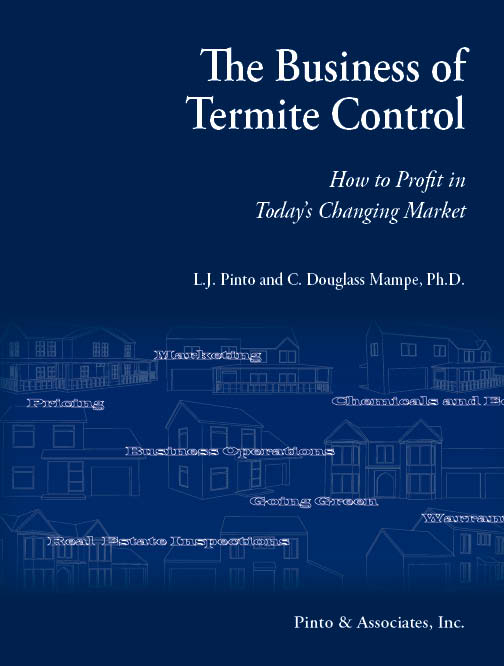Staffing and Compensation
The business operations needed in termite work are selling, servicing, and office assistance to set up appointments and handle billing and receivables. In a small company, the owner may do the selling and servicing. As the company grows, a technician will do the servicing while the owner still sells. The owner and/or the technician may do renewal inspections. Eventually, a dedicated sales force will sell while technicians will service and do reinspections.
Staffing Options
 |
| There is debate within the industry whether to use two-person or one-person crews for termite work |
| Photo by Larry Pinto from The Business of Termite Control |
Good business management practice tells us that one supervisor can effectively supervise eight people. This means that in a smaller company, a supervisor might also be charged with selling or servicing in addition to supervising. Budgets should be considered when a person with supervision responsibilities also has other duties. Part of the budgeted costs will go towards supervision but the remainder will be charged to service and/or sales.
A few companies have personnel “service what they sell” so these people have dual responsibilities. Experience shows that good sales personnel are often poor service people and good service technicians are often poor sales people. Some companies make this system work but interviews with these personnel show that they would prefer to do one or the other job – not both. Personality assessment tests can help you choose whether candidates will be better at technical or sales positions.
Another debate within the industry is whether to use two-person or one-person crews for termite work. In some states (such as New York), a second person is required to be inside when another applies termiticide from the outside. In this case, you have no choice. If there is no such requirement, most companies use one-person crews, they have been found to be more productive than two-person crews. There is, however, a safety issue with a one-person crew working in a crawlspace since a single technician can become entrapped or injured, and not have help available. This safety issue can be mediated to some extent by use of cell phones or radios. Two-person crews also may be necessary when long-rodding slabs. Construction type, then, may influence the size of a termite crew.
The argument can be made that a two-person crew can work twice as fast and then, only one truck, tank, pump, etc. are necessary which reduces capital costs. In this case, one person usually does the drilling and patching while the other makes the termiticide application. A two-person crew makes sense during training when the second person is the trainee.
Compensation
There are many forms of compensation in the industry. The most common ones are discussed here. That doesn’t mean a system not discussed here is wrong. Different systems are designed to accomplish different goals.
Sales personnel will usually receive a percentage of the sale. Many companies pay sales personnel a base salary and then add commission dollars. The purpose of a base salary is to provide personnel with enough pay to buy essentials and the commissions will add extras. This is intended to prevent sales personnel from selling jobs which the company does not want to take on. It also helps prevent ‘low-balling’ just to get the sale. In this type of system, sales commissions usually begin at 5 percent and can increase to nearly 10-15 percent if sales reach some predetermined level. Other companies do not pay a base salary – they only pay a commission. This puts pressure on sales personnel to sell everything and anything to meet their basic needs. This type of system usually begins with a commission of 10 percent and can increase up to 20 percent if certain sales goals are reached.
Either system rewards good sales personnel. The base-pay system can keep a less accomplished salesperson going for some time but increases the likelihood only desirable jobs will be sold and they will be priced correctly. Commissions are usually based on jobs sold, serviced and paid for. This prevents charge-backs for jobs sold but not serviced or paid for.
Technicians are usually paid an hourly wage. The rate varies among geographic areas. Technicians may be paid a 5 percent commission on jobs sold or referred but sales are not a major part of their compensation.
Management levels such as supervisors, branch managers and owners are usually paid salaries but some may be compensated further for exceeding production goals. Production goals are not necessarily just dollars sold but renewal retentions, retreats and other factors often enter into the equation. Some companies reward supervisors if they keep retreats at a low level (at or below one percent, for example).
Specific information on wages, salaries, and benefits that are offered by the pest control companies around the country are collected periodically by the National Pest Management Association. The most recent data is presented in the NPMA Pest Management Wage and Benefits Survey, and the report is available for purchase from NPMA (www.pestworld.org).
This article was excerpted from the new The Business of Termite Control: How to Profit in Today's Changing Market.


